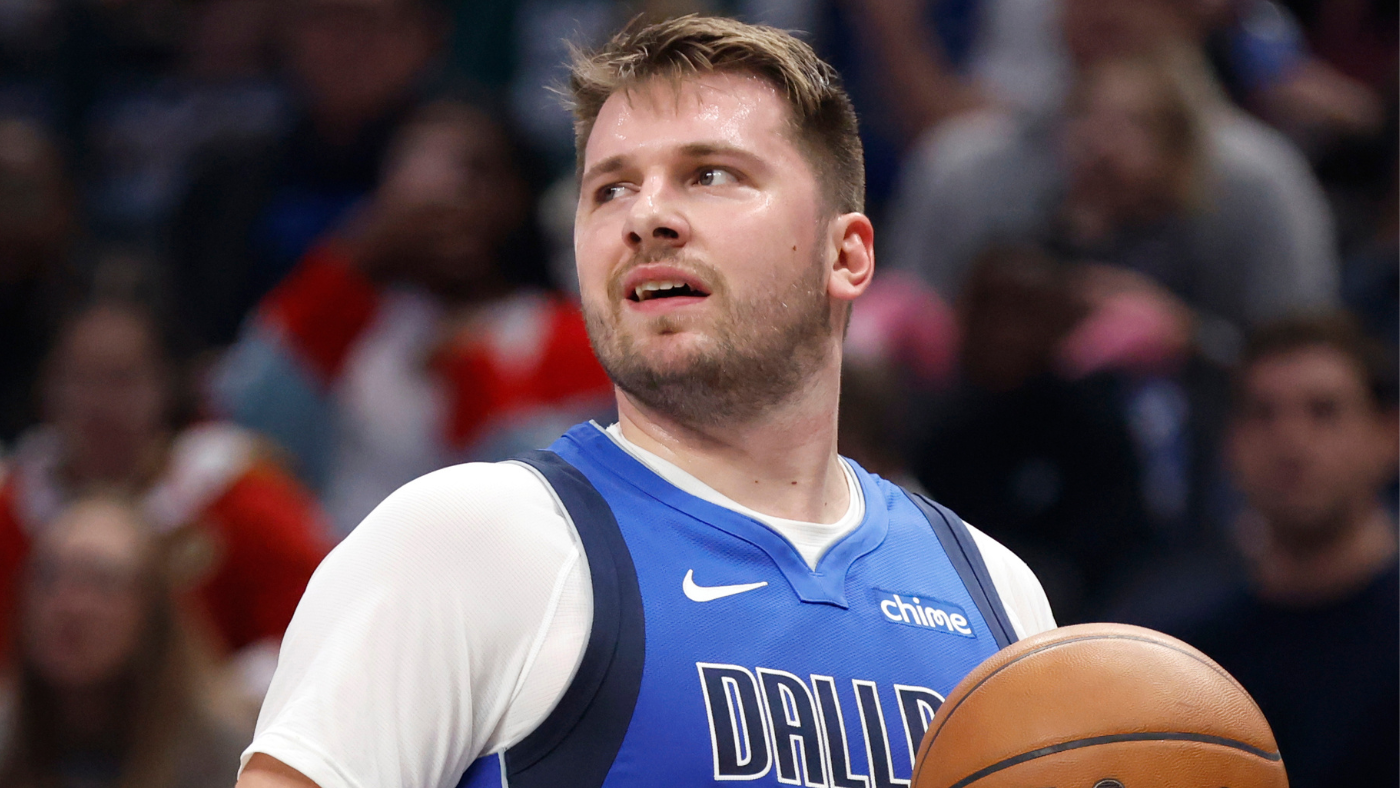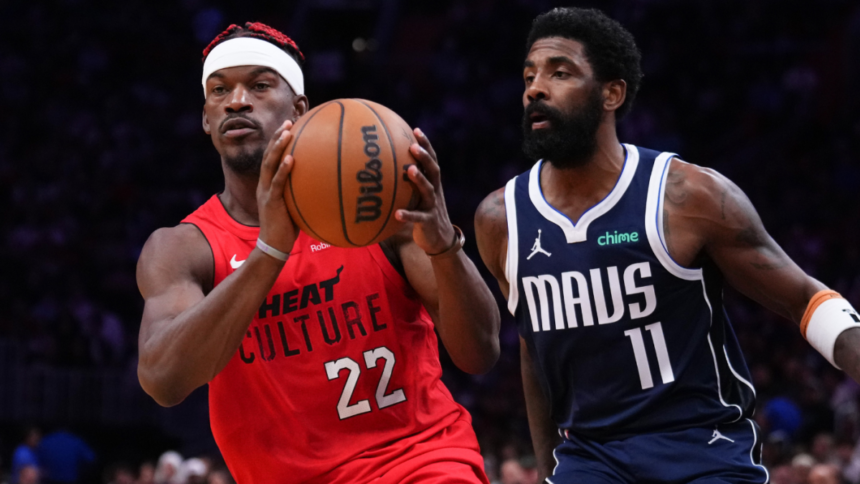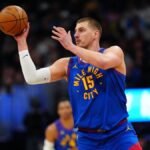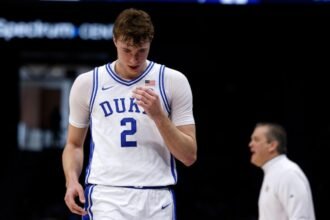NBA transactions don’t happen in a vacuum. They send shockwaves that reverberate for years after the fact. Think of the best teams in the NBA today. The Oklahoma City Thunder were built on the Los Angeles Clippers‘ decision to unite Kawhi Leonard and Paul George. The Cleveland Cavaliers are dominating because the New York Knicks couldn’t seal the deal on Donovan Mitchell. The Boston Celtics are the result of Mikahil Prokhorov’s impatience in building a winner in Brooklyn. Every action has a dozen equal and opposite reactions.
Luka Doncic is a member of the Los Angeles Lakers now. Anthony Davis is on the Dallas Mavericks. That is what we know today. The challenge is figuring out where this leads tomorrow. So with the dust now settled on the most surprising trade in NBA history, let’s dig through the rubble and try to answer some of the questions that are still lingering in the wake of the Lakers-Mavericks blockbuster.
1. So… Luka’s re-signing, right?
Remember when the Lakers traded for Dwight Howard? He was going to be the heir to Shaquille O’Neal, Kareem Abdul-Jabbar and Wilt Chamberlain in the long lineage of dominant Laker centers. The trade was heralded as a heist. Howard was gone in a year. Nobody is immune to the player empowerment era. The Spurs lost Kawhi Leonard. Jimmy Butler just took a wrecking ball to Heat Culture. Players are always going to act in what they perceive to be their best interests.
Dallas had the supermax trump card up its sleeve to offer Doncic. At a bare minimum, the Mavericks could have enticed him to sign and then traded him later. The Lakers don’t have that tool at their disposal because the trade to acquire him made him ineligible for the supermax. Financially speaking, they’re playing on a field that is much closer to level than the Mavericks were. We know the Heat are gearing up for 2026 free agency. The Spurs just got De’Aaron Fox, but they could be too. Until Doncic puts pen to paper, his future is uncertain.
Luka Doncic contract: Lakers trade takes largest NBA deal ever off table, but he could eventually get $400M
Sam Quinn

Now, as abrupt as this trade was, it’s unlikely that the Lakers made it blindly. They likely have some reason to believe Doncic is interested in a future in Los Angeles. Most players are. The Laker legacy holds enormous sway over most superstars. The weather and off-court opportunities don’t hurt either. Doncic may not have signed an extension yet, but it’s unlikely that he’s planning an exit yet, either.
In all likelihood, this is going to be an ongoing recruiting process. Doncic can’t even legally extend for six months. That means that the Lakers have the rest of this season to show Doncic what a future in Los Angeles would be like. Doing so from an on-court perspective is going to be difficult. LeBron James is 40. He probably isn’t going to be around too much longer. The Lakers have no centers. Their only two-way wing is Dorian Finney-Smith, a solid but declining 31-year-old. The reality here is that most of the roster Doncic would eventually win with in Los Angeles hasn’t been built yet. Putting a contending roster around him is going to take time.
The Lakers need to take steps in that direction ahead of Thursday’s trade deadline. They need to nail the offseason as well. Doncic is coming off of a trip to the Finals, and he’s now in his seventh NBA season. These are prime championship years. In a perfect world, he’d win those championships in Los Angeles. It doesn’t seem especially likely that re-signs in Los Angeles if he doesn’t think he can do so. Rob Pelinka has work to do.
2. So… Kyrie’s re-signing right?
According to Marc Stein, Kyrie Irving “by all indications, remains on course for a new multi-year deal in July.” Unlike Doncic, Irving is a player general manager Nico Harrison has deep ties to dating back to his time at Nike. The offense in Dallas is his now. The Mavericks were willing to surrender Doncic in part because they had Irving to lead their offense moving forward.
But Irving has never been known for his reliability. He told Boston Celtics fans he planned to re-sign and then he didn’t. He built his dream team in Brooklyn and things fell apart there for non-basketball reasons. He’s been a model citizen in Dallas, but part of the appeal of sending him there was that he could be a second fiddle to Doncic. Now he’s about to turn 33 and will be entrusted to initiate almost all of Dallas’ offense. Does he want that?
Irving has a player option this offseason. That gives him a lot of flexibility to feel this situation out, not only in Dallas, but also to see what is available to him elsewhere. Notably, James has a player option for next season. Could he and Irving both take pay cuts to reunite in Los Angeles, a team Irving has wanted to play for in the past? Remember, Irving once tried to recruit James to Dallas. Maybe next season is their last chance to pair up, and with Doncic by their side.
Maybe Irving picks up the player option, gives it another go in Dallas after this season, and re-evaluates from there. There aren’t exactly great options for him in 2025 free agency if he wants a max salary. The only team with max space at the moment is Brooklyn. It’s probably fair to guess that neither side wants a reunion there.
As is the case for Doncic, what happens in the coming months will go a long way toward informing Irving’s decision. The Mavericks are, by far, the favorites to retain his services, but given the massive change that just took place, anything feels possible for Irving’s future.
3. Do the Mavs have another big move left in them?
We know the Lakers are going to make more moves. It’s a given when a team more or less lacks an entire position. But Dallas is in a much more interesting position. The Mavericks don’t have the long runway that comes with employing a 25-year-old All-NBA player anymore. They have to win now. That means deploying every asset they have for win-now upgrades.
The obvious need here is another shot-creator to help fill in for Doncic. The best one on the market is Jimmy Butler, but getting him would be enormously difficult for Dallas given the makeup of their balance sheet. Butler makes nearly $49 million. Outside of Davis and Irving, no Maverick makes even $16 million. It would have to be a three- or four-for-one trade, which usually requires multiple teams.
Even then, would it be worthwhile? Say, for instance, the Mavericks traded Klay Thompson, P.J. Washington and Daniel Gafford for Butler. We’ll charitably assume that either the Heat are willing to take on Thompson’s three-year deal or that someone else would. In that scenario, the Mavericks would have a trio of Irving, Butler and Davis. They’d have Dereck Lively to play center next to Davis down the line, but he’s not expected to return any time soon. Removing Gafford means Davis has to play center. He can do that. He frankly probably should. But he certainly doesn’t want to, and antagonizing him right after acquiring him doesn’t seem like the best idea.
Beyond those four players, they’d have Naji Marshall, Max Christie and Quentin Grimes to hold the primary 3-and-D roles. Jaden Hardy and Spencer Dinwiddie would provide the spare ball-handling. Olivier-Maxence Prosper has made progress this season and could grow into a wing slot. Dante Exum is useful in small bursts. That supporting cast is… fine? It’s an awfully big bet on players with limited postseason track records, and of course, Irving and Butler are both mercurial to say the least. That group could probably be great this season and then maybe last for another year or two before aging out.
It’s worth considering, but Dallas would probably prefer to at least explore other options first. How about Collin Sexton in Utah? He’s quietly had a stellar run with the Jazz since his inclusion in the Donovan Mitchell trade, and he’s ready to join a winner as a major part of a good offense. He’d cost only one player out of the Gafford-Washington-Thompson group at least from a financial perspective, but the Jazz would almost certainly want a good return in terms of draft picks. The Bulls with Coby White are in the same boat.
Dinwiddie and Hardy have been decent enough regular-season stop gaps. Someone on this team besides Irving needs to be able to dribble if the Mavericks are going to make any noise in the postseason. Winning now was seemingly the whole point of the Doncic trade, so Dallas is going to have to make the next few days count.
4. What does this mean for the broader star trade landscape?
Over the past few seasons, a certain rhythm had developed to superstar trade requests. Those players would sign contract extensions with their existing teams and then force a move afterward, once they had already been paid. Bradley Beal and Damian Lillard were poster boys for this approach. Beyond them a number of players may not have directly forced the trade, but were dealt after re-signing because of the security the acquiring team felt in landing a player that was locked into a deal. Dejounte Murray and Donovan Mitchell come to mind here. And then there are players whose trade requests formed out of a desire to get paid. Kyrie Irving and Jimmy Butler fit that trend. Overall, the league was moving toward trading players either after they signed new deals or as soon as they requested them.
The Doncic and De’Aaron Fox trades bucked those trends. In neither case did the star directly ask for a trade. It is not clear that Doncic would have signed an extension in Dallas, but the Mavs could have made him turn down $345 million. The whole world knew that Fox wanted to get to San Antonio, but it was the Kings who initiated trade talks, not Fox’s camp. Both Doncic and Fox can reach free agency in the summer of 2026.
Is this the beginning of a more proactive period in star trade history? It’s too early to say, but the logic makes sense. Think about the teams that have done the best in these deals. The Jazz got monster returns for Mitchell and Rudy Gobert because they acted early. There were unique circumstances involved in Oklahoma City’s decision to trade Paul George, but the same basic principle applied there as well. Once a player has directly asked for a trade or has a specific destination in mind, the return plummets.
Now, this doesn’t mean that teams should trade their best players blindly. It just means teams need to be realistic with themselves. The Jazz and the Thunder knew that their contention windows were over, so they acted before their players forced them to. That’s not exactly what the Mavericks and Kings did here, but it’s going to be a thought process that becomes more pervasive as the new CBA sinks its teeth further and further into the league. It is fundamentally easier to trade a player before he signs that monster extension because his lower cap number means a great deal against the aprons. Teams still would have signed up to trade for Doncic at the supermax, but doing so would have at least been more complicated.
Every star trade is unique, but the logic informing roster-building is usually consistent. Teams are broadly trying to do the same things. Dallas and Sacramento acted early in making these trades. Don’t be surprised if more teams follow.






